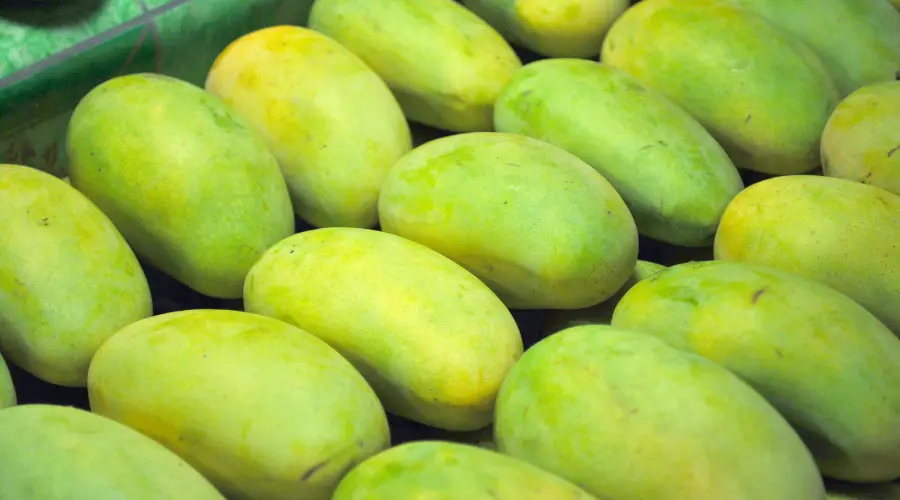Horses are funny eaters- they like to try everything.
And odd things too!!!
If you have a horse, you know their weird behavior – First, sniff curiously and then take a small bite. But that doesn’t mean they can eat everything.
Fruits and veggies are good for horses- but not all of them.
You must know what horses can and can’t eat as a hippophile. Today we’re going to talk about a particular tropical fruit. Can horses eat mangoes? And is it ok for them?
That’s something you’re also concerned about, right? Well, let’s get right into the main topic straight.
Read also: Looking to add some variety to your horse’s diet? Check out our article on whether runner beans are safe for horses to eat.
Is mango safe for horses?
Yes, mango is safe for the horse if you remove the pit to avoid choking issues. The leave, bark, and outer layer of the mango may cause some skin reactions, but there is no evidence of severe health problems after mangoes.
As this fruit is relatively high in sugar fructose, it will be better to give a small quantity if your horse is insulin resistant.
Which parts can horses eat?
Only flesh.
Never even give your horse the whole mango. Why? That’s because of the pit inside the fruit. The pit can be stuck in the throat and make your horse choke.
You probably already see the size of the pit, right?
Quite large!
This juicy fruit is from the cashew family, Anacardiaceae. The main thing is mangos are also drupe, a term used for fruit with a single large seed or pit in the middle.
It is recommended to peel and cut it into small chunks before feeding your horse. You can also use this nutrition-dense fruit to make a treat for the horse. It has high levels of antioxidants which help protect against disease.

Read also: Alfalfa pellets and grain are two popular options for horse owners. But what are the differences? Let’s take a closer look.
Nutritional facts about mangos
Mangoes are called the “king of fruits,”
Wondering Why?
Well, these tropical fruits are high in antioxidants and fiber and are a good source of vitamin C, dietary fiber, vitamin B6, and B12. Apart from that, the sweet, golden flesh is also a good source of proteins, potassium, and magnesium.
Let me show you how much nutrition one cup of sliced (about 165 grams) contains…..
| calories | 107 |
| fiber | 3 grams |
| sugar | 24 grams |
| protein | 1 gram |
| vitamin A | 25%daily value |
| vitamin C | 76 percent daily value |
| vitamin B-6 | 0.2 mg |
| potassium | 257 mg |
Can horses eat green mangoes & leaves?
From our experience, we notice that horses don’t like the sour taste.
It’s better to avoid feeding unripe mango as the skin can cause irritation for horses. On the other hand, raw fruits are hard to digest. So that can make horses’ stomachs upset. At the same time, the leaves and bark of this tree are not safe for horses.
Can horses eat dried? How many should you feed your horse?
One or two dried slices are totally fine for the horse. In fact, these could be a healthy treat for your equine friend. And if it’s fresh, then half a cup of sliced is safe to feed the horse.
Remember one thing – moderation is the key.
Read also: Horses are known for being herbivores, but did you know that they can actually eat fish and other meat?
What are the risks of feeding horses?
It is yummy.
No wonder not only humans, but livestock also love it too. But here is the deal…..
One mango has a whopping 46 grams of sugar.
Yes, these are natural sugars but still. So if your horse is on the chubby (& cute) side, you’ve got to be careful. Here is a list of the medical and physical conditions that need proper attention before adding sweet fruit like mangoes.
- Laminitis.
- Insulin resistance.
- Metabolic syndrome.
- An inactive or overweight horse.
Read more: Did you know that buttercups can be toxic to horses? Find out more about this and other important facts about these beautiful flowers.
The bottom line….
Mangoes could be a great addition to the horse diet because they have a high nutritional value. But it should be ripe and given in small amounts. And don’t forget to remove the pit from the mangoes before feeding it to any livestock.
These summer sweet fruits can bring a variety to break the boredom of the same food every day for the horse. But again, we gotta say, keep it in moderation.



